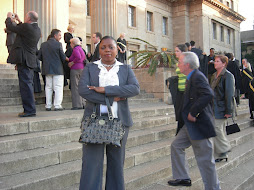My two first weeks of internship at the CSVR
On the 1st of July I started my internship at the Centre for the Study of Violence and Reconciliation, or CSVR. The CSVR is an NGO based in Braamfontein, in Johannesburg. It defines itself as “a multi-disciplinary institute involved in policy formation, community interventions, service delivery, education and training, as well as providing consultancy services. The primary goal of the CSVR is to use its expertise in building reconciliation, democracy and a human rights culture and in preventing violence in South African and in other countries in Africa”. Its vision is to promote peaceful societies based on democracy, human rights, social justice, equality and human security; with the mission of contributing to the building of violence-free societies and the promotion of sustainable peace and reconciliation by means of research, advocacy and other interventions and through establishing strategic partnerships with organs of the state, NGOs, community organizations, individuals and international allies.
The CSVR offers:
· Consultancy services;
· Training courses;
· Research and publications
· Programmes (Criminal Justice Programme, Gender Based Violence Programme, Peace building Programme, Transitional Justice Programme, Trauma and Transition Programme, and Youth Violence Prevention Programme).
In fact, I am working with the Gender Based Violence Programme which deals with women and young girls in diverse ways. This encompasses working with health care systems, the criminal justice system, development interventions as well as initiatives promoting women's socio-economic rights. Efforts to prevent gender based violence are central to the Programme, and so is the drive to build and strengthen organizations working in this field.
In much of the Programme’s work, the emphasis is on the rights and needs of marginalized groups of women, including girls and women in conflict with the law, adolescent girls, women infected or affected by HIV and AIDS, rural women, homeless women, etc.
It is really a new field for me; however, the experience is very enjoyable. I am working with two ladies, the Programme Manager and a junior researcher. I also met a fellow colleague from my department at Wits, who is working in the same programme on a part-time basis. So, I don’t feel lost. I am quite comfortable with my current home.
I have been assigned three major tasks, including updating the “National Directory of Services Addressing Gender Based Violence” by the end of July, participation in the ongoing project on the “gendered nature of xenophobia”, as well as some admin tasks. These include compiling financial reports, preparing meetings – especially one on this 21st of July – for working groups of different projects of the Programme.
About the xenophobia project, we will probably be conducting surveys with migrant women in Cape Town, Durban, and Johannesburg.
There is too much to say, but my time is very limited. I am discovering a new world. People seem to be flexible, tolerant, independent, and responsible. It is quite a lot to learn.
Find more about the CSVR: www.csvr.org.za
The CSVR offers:
· Consultancy services;
· Training courses;
· Research and publications
· Programmes (Criminal Justice Programme, Gender Based Violence Programme, Peace building Programme, Transitional Justice Programme, Trauma and Transition Programme, and Youth Violence Prevention Programme).
In fact, I am working with the Gender Based Violence Programme which deals with women and young girls in diverse ways. This encompasses working with health care systems, the criminal justice system, development interventions as well as initiatives promoting women's socio-economic rights. Efforts to prevent gender based violence are central to the Programme, and so is the drive to build and strengthen organizations working in this field.
In much of the Programme’s work, the emphasis is on the rights and needs of marginalized groups of women, including girls and women in conflict with the law, adolescent girls, women infected or affected by HIV and AIDS, rural women, homeless women, etc.
It is really a new field for me; however, the experience is very enjoyable. I am working with two ladies, the Programme Manager and a junior researcher. I also met a fellow colleague from my department at Wits, who is working in the same programme on a part-time basis. So, I don’t feel lost. I am quite comfortable with my current home.
I have been assigned three major tasks, including updating the “National Directory of Services Addressing Gender Based Violence” by the end of July, participation in the ongoing project on the “gendered nature of xenophobia”, as well as some admin tasks. These include compiling financial reports, preparing meetings – especially one on this 21st of July – for working groups of different projects of the Programme.
About the xenophobia project, we will probably be conducting surveys with migrant women in Cape Town, Durban, and Johannesburg.
There is too much to say, but my time is very limited. I am discovering a new world. People seem to be flexible, tolerant, independent, and responsible. It is quite a lot to learn.
Find more about the CSVR: www.csvr.org.za





